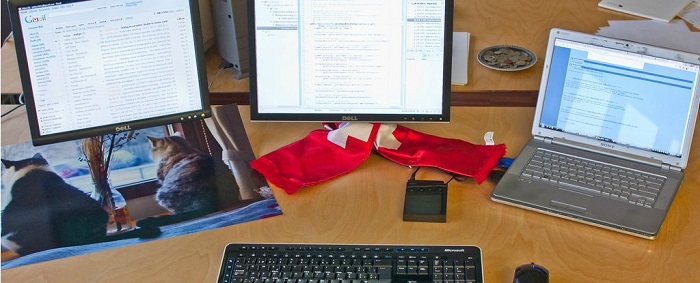"That [task] switching comes with a biological cost that ends up making us feel tired much more quickly than if we sustain attention on one thing," behavioural neuroscientist Daniel Levitin from McGill University in Canada tells Olivia Goldhill at Quartz.
Studies suggest you could actually be reducing your productivity by as much as 40 percent by switching between tasks rather than just finishing one and moving on to the next. There`s even evidence it can cause permanent damage to the brain.
Why? Well, all that constant switching uses up oxygenated glucose in the brain, making us more tired and less able to take on the big tasks that need doing. The brain uses glucose to fuel all its cellular activities, and neurons can`t store extra reserves – which means you don`t want to run out, because doing so impedes neural communication.
But despite being tired, we keep doing it anyway, because multitasking in itself becomes addictive.
"Multitasking creates a dopamine-addiction feedback loop, effectively rewarding the brain for losing focus and for constantly searching for external stimulation," Levitin explains in a column for The Guardian. "To make matters worse, the prefrontal cortex has a novelty bias, meaning that its attention can be easily hijacked by something new."
There`s also evidence that information learned while multitasking goes to the "wrong part of the brain", and isn`t stored as it should be.
So what`s the solution? The antidote to this constant mental plate-spinning could be a more deliberate approach to tasks, and some scheduled breaks, – rest periods that allow for daydreaming and mind-wandering.
Taking 15-minute breaks every couple of hours has been shown to make people more productive, but if you don`t have time for that, you`re better off staring out the window rather than checking Facebook, because that will just fracture your attention span even further.
Psychologist Gloria Mark from the University of California, Irvine says we should give up on multitasking completely and set aside dedicated slots of time for each task. In other words, you`ve got 10 minutes for Twitter in the morning, and that`s your lot until tomorrow.
But there`s some evidence that repeating a task again and again makes us better at doing it alongside other tasks.
A 2015 study by researchers at the University of Queensland in Australia found that when people were trained to do specific things at the same time, their multitasking performance improved for those particular tasks. The catch is that scientists still aren`t sure whether that kind of focused training would help us get any better at multitasking outside the lab.
One approach to enhancing your multitasking could be to learn a musical instrument. A 2014 Canadian study found that the dexterous task-switching required in learning to play music could train you to become better at switching between other tasks as well.
Ultimately, though, you probably should just work through one task at a time if you want to be as efficient as possible. And for extra points, try reflecting on what you`ve just completed afterwards as well – even if there`s another browser tab you really ought to get to.
More about:















































